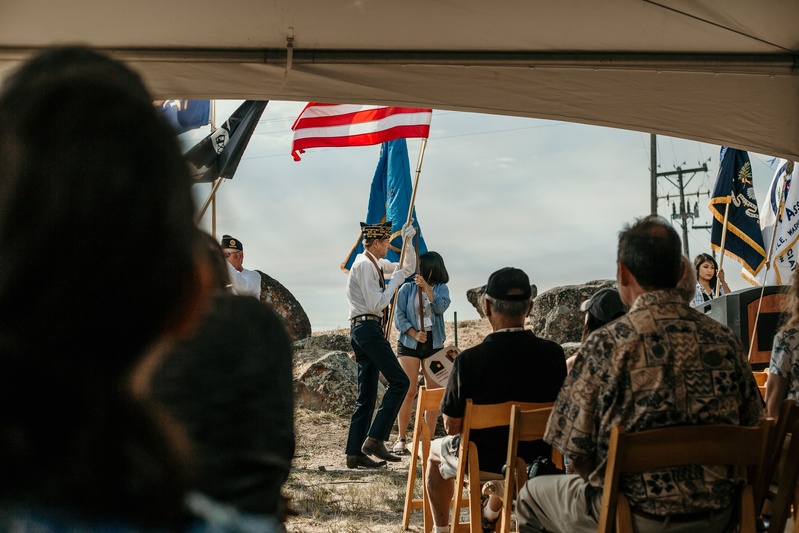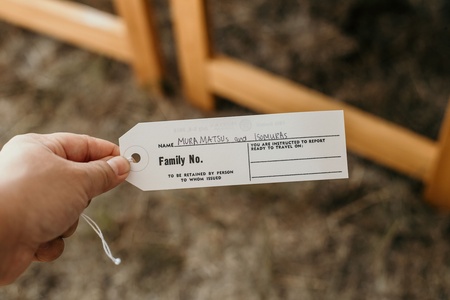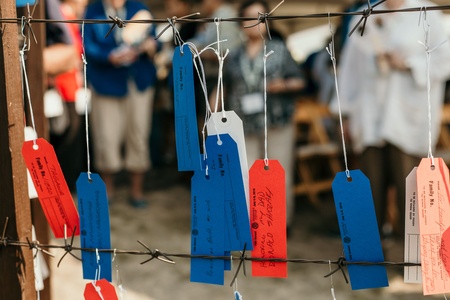On a dry July morning, large white tents shaded me, and two hundred others, from the desert sun. We were at the end of a three-day journey in southern Idaho on the Minidoka Pilgrimage. Minidoka, also known as Hunt Camp, was one of 10 concentration camps in the United States during the Japanese American incarceration, which began in 1942, the same year as in Canada. The pilgrimage is an annual event including educational workshops, talk-back sessions, a tour of Minidoka—which originally spanned 33,000 acres—and a closing ceremony. Each year, more than 200 individuals and families attend.
A volunteer distributed small tags to the participants--most of the tags were white, though some were shaded in red and blue, representing the colours of the American flag. I sat alone as the tags were distributed. Hunched over, as if guarding a secret, I neatly wrote the family names of my Japanese Canadian grandparents in block letters on a white tag: ISOMURA and MURAMATSU. Around me, over a hundred strangers did the same, silently replicating a fragment of Japanese American history. A few minutes earlier, I had hurriedly searched emails for the correct spelling of my grandmother’s family name. Sometimes it slipped away from me, like the family names of other relatives I've met only a handful of times.
During the weekend, Nisei shared their memories from Minidoka and other camps, struggling to hold back tears. Passion-fueled comments acknowledged ongoing injustices. I watched as multi-generational families huddled together. Witnessing the intimacy of these moments, I often reflected back to my own family, and I wished my Canadian parents and sister were experiencing the Minidoka Pilgrimage with me. Thinking about the internment and incarceration of Japanese Canadians and Americans, I wanted to honour each individual and family who experienced that hardship during the Second World War. With over 22,000 Japanese Canadians, and 110,000 Japanese Americans, interned and incarcerated, that amounts to over 132,000 different stories and experiences--132,000 people who faced injustices caused by two separate government bodies out of unjustified fear.
My body stirred with anger and sadness. I let the notion pass.
A Mixed Legacy
After the Second World War, Japanese Canadian and Japanese American families were intentionally scattered across the country and even to Japan, a foreign country to those Nisei. That experience led my grandparents to small towns in Ontario and later to Montreal, QC, to raise a family. Eventually they returned to the West Coast, laying new roots in Richmond. They never shared their experiences within our family. Only recently, one of my aunts told me this about my grandma: “I remember asking Emma about the experience [of internment] and she would always minimize it saying she didn't want to depress us.”
It’s a strange feeling to honour people you have little connection with. My grandparents died before I was born. Yet, without them and their own parents enduring the hardships that they did, many of us wouldn’t be where we are today. It’s a bittersweet history with loss in many forms--and, at the same time, a new sense of community and reclamation. Many of us in the youngsei generation grew up without the stories of our grandparents. We were often isolated from the Japanese Canadian community and others of Japanese ancestry. Through the Minidoka Pilgrimage and other events, I hope that narrative is beginning to change.
*This article was originally published in Nikkei Images in Volume 23, No. 2 in 2018.
© 2018 Kayla Isomura





